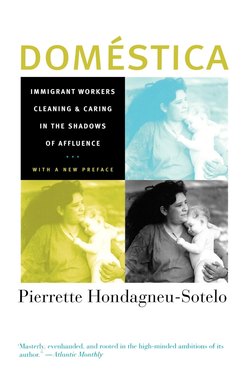Читать книгу Domestica - Pierrette Hondagneu-Sotelo - Страница 8
ОглавлениеAcknowledgments
This is a story about domestic lives, and I owe a deep debt of gratitude to the women who allowed me to probe into the crevices of their lives and homes. They tolerated all sorts of intrusive, nosy questions that I would never consider asking them in other contexts, they sat and talked with me for hours, and they shared incredible stories of human resilience and tragedy. They may not agree with everything I have to say, but I hope that our mutual efforts eventually lead to greater justice.
The book is dedicated to Cristina Riegos, who was working toward that goal until her life was cut short by cancer. She brought tremendous creativity, charisma, and smarts to her job as an organizer among Latina immigrant domestic workers in Los Angeles. Because of her initial efforts, the Domestic Workers' Association, which I detail in the final chapter of this book, is still thriving.
I received research support from several funding sources. Most of the research was supported by a grant from the Social Science Research Council, through their Inter-University Program for Latino Research. At the University of Southern California, the Southern California Studies Center funded the research on domestic employment agencies, and the College of Letters, Arts, and Sciences provided Zumberge grant seed money to get this project off the ground. Funded research allowed me to hire research assistants who took on the monumental task of typing the verbatim transcriptions of the interviews, as well as other chores. For their efforts, I owe big thanks to Kim Huisman, Gloria González-López, Ernestine Avila, José Rodríguez-Pozeilov, Wendy de Boer, Cynthia Cranford, Maria Elena Espinoza, and Carrie Sutkin. Turning the research into a book became possible because I received in-town, in-residence writing fellowships at the Getty Research Institute and at the UCLA Chicano Studies Research Center.
Public and private conversations with many people furthered my thinking about this topic. Particularly helpful were audience questions and responses to presentations that I made at the Getty Research Institute; the International Sociological Association conference on International Cities at Humboldt University in Berlin; the Care Work, Gender, and Citizenship conference at the University of Illinois; colloquia at the Department of Ethnic Studies at UC San Diego and the Departments of Sociology at UC Berkeley and UC Irvine, as well as the Public Policy Institute at UCLA; the UC-Mexus meetings; seminars at El Colegio de la Frontera campus in Tijuana, El Colegio de Michoacán in Zamora, Michoacan, and at the Center for Working Families at UC Berkeley; American Sociological Association meetings in Toronto, San Francisco, and Chicago; and classroom discussions at UC Santa Barbara, UCLA, the College of William and Mary, and especially with students at USC. I hate being publicly challenged with tough questions, but my exposure to them, in all these settings, greatly helped this book evolve.
Commentary on particular chapters by good friends and colleagues also helped. Conversations with Mike Messner, Barrie Thorne, Laura Pulido, Elaine Bell Kaplan, Vilma Ortiz, Hector Delgado, Sarah Mahler, Barbara Laslett, Mary Romero, Patricia Fernández-Kelly, Gul Ozygin, Pei-Chia Lan, Michael Burawoy, Deborah Stone, and the late Cristina Riegos also moved this project forward. Deborah Stone gave me a big gift when she read the entire manuscript with an eye trained in public policy and politics. When I needed information on Central American immigrants, Louis di Sipio and Cecilia Menjívar moved with the speed of light and graciously shared the results of their own research with me. Warm thanks to Naomi Schneider, my editor at the University of California Press, and to Alice Falk, an amazingly attentive copyeditor. Victor Narro, an attorney who runs the workers' rights program at the Coalition for Humane Immigrant Rights of Los Angeles, helped guide me through what seemed like gobbledygook in the legal codes, enabling me to write Chapter 8. Héctor Delgado deserves special recognition because he selflessly read and commented on many early drafts of chapters. He is one of the few professional-class men who actually engages with the nitty-gritty of social reproductive work, and does so with humor.
During the period I worked on this project, I experienced the metamorphosis of my sons Miles and Sasha from nearly preverbal, physically dependent little kids into, respectively, one caring, empathetic electric guitar player and one firecracker of boisterous energy that I siphon to replenish my inner reserves. Life at home with them and Michael Messner—companion, confidant, morning coffee maker, and co-conspirator in all of this—proves that hard work can be lots of fun. It's never seamless, but let's keep those home fires burning.
